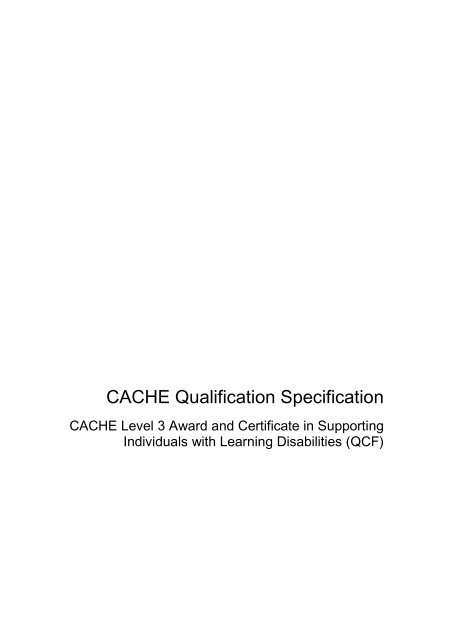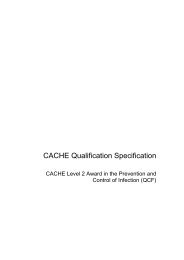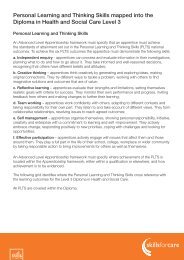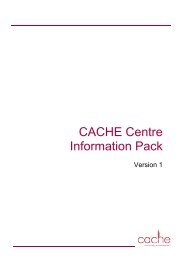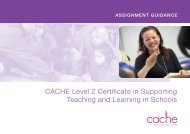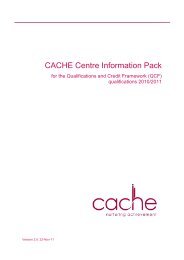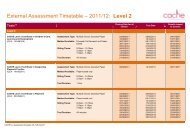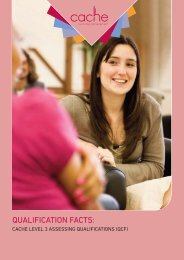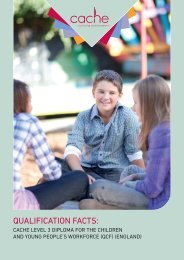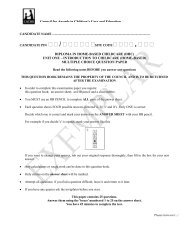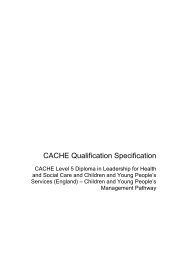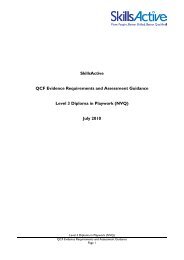CACHE Qualification Specification
CACHE Qualification Specification
CACHE Qualification Specification
Create successful ePaper yourself
Turn your PDF publications into a flip-book with our unique Google optimized e-Paper software.
<strong>CACHE</strong> <strong>Qualification</strong> <strong>Specification</strong><strong>CACHE</strong> Level 3 Award and Certificate in SupportingIndividuals with Learning Disabilities (QCF)
<strong>CACHE</strong> Level 3 Award and Certificate in Supporting Individuals with Learning Disabilities (QCF)<strong>CACHE</strong> © Copyright 2013 All rights reserved worldwide.Reproduction by approved <strong>CACHE</strong> centres is permissible for internal use under the followingconditions:<strong>CACHE</strong> has provided this <strong>Qualification</strong> <strong>Specification</strong> in Microsoft Word format to enable its Centres touse its content more flexibly within their own course materials. You may copy and paste any materialfrom this document; however, <strong>CACHE</strong> does not accept any liability for any incomplete or inaccuratecopying and subsequent use of this information. The use of PDF versions of our support materials onthe <strong>CACHE</strong> website will ensure that correct and up-to-date information is provided to learners.Any photographs in this publication are the exclusive property of <strong>CACHE</strong> . They are protected undercopyright law and cannot be reproduced, copied or manipulated in any form. This includes the use ofany image or part of an image in individual or group projects and assessment materials. All images havea signed model release.<strong>Qualification</strong> reference numbers:<strong>CACHE</strong> Level 3 Award in Supporting Individuals with Learning Disabilities (QCF) 600/4037/3<strong>CACHE</strong> Level 3 Certificate in Supporting Individuals with Learning Disabilities (QCF) 600/4216/3Published in Great Britain by <strong>CACHE</strong>First edition 2011 Book code N/APublication dateVersion 1.0 December 2011Version 1.0 July 2012Version 2.0 May 2013PublisherCouncil for Awards in Care, Health and EducationApex House81 Camp RoadSt AlbansHertfordshireAL1 5GBTelephone: 0345 347 2123Registered Company No: 2887166Registered Charity No: 1036232© <strong>CACHE</strong> 2013 Version 2.0 2
<strong>CACHE</strong> Level 3 Award and Certificate in Supporting Individuals with Learning Disabilities (QCF)Assessment guidance 66Assessment strategies and principles relevant to this qualification 67Skills for Care and Development Assessment Principles / <strong>CACHE</strong> Assessment Strategy 67Section 5: Feedback 69QCF Support Materials Feedback Form 71Section 6: Documents 73Useful documents 73Mandatory documents 73Section 7: Publication history 75© <strong>CACHE</strong> 2013 Version 2.0 4
Section 1: General introduction© <strong>CACHE</strong> 2013 Version 2.0 5
Section 1: General introductionAbout this <strong>Qualification</strong> <strong>Specification</strong>This <strong>Qualification</strong> <strong>Specification</strong> contains all the mandatory units and assessments you will needto complete as part of the qualification. As well as the mandatory units there is a choice of‘optional units’ which form part of the qualification. These are available on our website. Yourtutor or assessor will either supply you with copies of your chosen units or direct you to therelevant page on the website so you can download them. This <strong>Specification</strong> also contains extrainformation for your tutor or assessor.How the qualification worksThis qualification is made up of units each representing a small step of learning. This allows thequalification to be completed at your own pace.All of the units achieved can be ‘banked’. This means that if you want to take anotherqualification which includes the same units you do not have to take them again.Each unit has:• a level - shows how difficult it is• a credit value - one credit represents about 10 hours' work• a unit aim – explains what is covered in the unit• learning outcomes – cover what you need to do (skills) or what you need tounderstand (knowledge)• assessment criteria – what you need to show (evidence)Each learning outcome is linked to a number of assessmentcriteria. Evidence must be provided for all the assessmentcriteria to gain the unit.Example shows how outcomes and criteria are laid out in the Unit Assessment Records (UARs) in Section 3© <strong>CACHE</strong> 2013 Version 2.0 6
Section 1: General introductionUnderstanding learning outcomesThere are two main types of learning outcome:• Skills that can be performed• Knowledge that can be learnt.Sometimes they can cover a combination of the two.Competence / Skills based learning outcomes:• generally begin with ‘Be able to’ and the assessment criteria usually show that theevidence must be observable• are about being able to perform a variety of different tasks as part of your work rolewithin a real work environment.Knowledge based learning outcomes:• generally begin with ‘Know’, ‘Understand’ or ‘Know how to’ and the assessmentcriteria will reflect that evidence can be recorded in ways other than observation,although observation remains a valid method (however, some learning outcomescould be purely knowledge based and do not need to be in the context of a workrole).For your convenience, Knowledge-only units are indicated by a lightbulb in both theUnit Achievement Log and at the top of the units.If a unit is not marked with a lightbulb, a unit has some Skills/Competencecomponent(s).© <strong>CACHE</strong> 2013 Version 2.0 7
Section 1: General introductionMaking use of the <strong>CACHE</strong> websitesThe <strong>CACHE</strong> websites are maintained on a regular basis and this is where the most up to datedocuments can be found. We strongly advise that these should be used as a resource on anon-going basis to ensure you always have the most current information.All our qualification documents are version controlled, allowing you to check for updates orrevisions.The Public WebsiteOur public website address is: www.cache.org.uk and contains information that is available toeverybody. It contains information about all our qualifications, including:• Key Facts• <strong>Qualification</strong> <strong>Specification</strong>sThere are also some other key documents that can be referred to when required. For example:• Complaints Procedure• Appeals Process• Equality and Diversity Statement – our approach to non-discrimination• <strong>CACHE</strong> Statement of Values – our values when working with children or youngpeopleIt also contains regular news updates and case studies and links to websites from otherorganisations that might be of interest.The Centre Secure WebsiteMore specific information to support Centre delivery can be found on our secure website‘cachezone’. This site is for Centres only.Login is via the ‘cachezone page’ on our public website using the details provided by theCentre administrator.© <strong>CACHE</strong> 2013 Version 2.0 8
Section 2: About these qualifications© <strong>CACHE</strong> 2013 Version 2.0 9
Section 2: About these qualifications<strong>Qualification</strong> summaryTitleType<strong>CACHE</strong> Level 3 Award in Supporting Individuals with Learning Disabilities(QCF)QCF<strong>Qualification</strong> number 600/4037/3AimThis qualification provides learners with the opportunity to develop theirknowledge and skills around supporting individuals with learningdisabilities. It is aimed at learners who support individuals with learningdisabilities as part of their job role.The units offered within this qualification mirror those offered within theLearning Disabilities Pathway of the Health and Social Care Diplomas inEngland.PurposeOfqual code and description(where applicable)E. Updating and continuing professional developmentE3. Develop knowledge and/or skills relevant to a particular specialisationwithin an occupation or set of occupationsGuided learning hours Min 83 Max 122Credit value 12 Minimum credits at / above Level 7Minimum age oflearnerAge ranges covered bythe qualification16N/AReal work environment(RWE) requirement /recommendationRules of CombinationProgressionincluding Job Roles (whereapplicable)Equivalencies /Performance PointsIt is recommended that learners are working, volunteering or on practicalplacement to be able to show competence in both knowledge and skills.To achieve this qualification, learners must gain 12 credits. They must dothis by gaining 4 credits from the mandatory unit, and at least a further 8credits from the optional units. A minimum of 7 credits must be achieved atLevel 3 or above.This qualification enables learners to progress to the <strong>CACHE</strong> Level 3Certificate in Supporting Individuals with Learning Disabilities (QCF)and/or the <strong>CACHE</strong> Level 3 Diploma in Health and Social Care (QCF), or toprogress into employment.Please refer to cachezone for up-to-date information on Equivalencies andPerformance Points for <strong>CACHE</strong> qualifications.© <strong>CACHE</strong> 2013 Version 2.0 10
Section 2: About these qualificationsRecommendedassessment methodsAll units are internally assessed.Assessment enables the learner’s workplace practice to provide evidencefor individual units as well as the whole qualification. Methods ofassessment could include:• Inference of knowledge from direct observation of practice• Witness evidence when directed by the sector skillsassessment strategy• Professional discussion• Reflection on own practice in real work situations• Written assignments• Learner’s own plans and written records• Task set by <strong>CACHE</strong> for knowledge learning outcomes only *The qualification will be pass or refer and all the assessment criteria of thechosen units must be achieved in order to obtain a pass.* NB: <strong>CACHE</strong> assessment tasks are provided for tutors’ convenience. They are not mandatory.Additional assessmentrequirementsGrading systemHow long will it take tocomplete?Entry requirements /recommendationsAll units must be assessed in line with the Skills for Care and DevelopmentQCF Assessment Strategy.PassLearners can usually complete the Award in 6 months.Learners should be at least 16 years old. <strong>CACHE</strong> does not set any otherentry requirements but Centres may have their own guidelines.© <strong>CACHE</strong> 2013 Version 2.0 11
Section 2: About these qualifications<strong>Qualification</strong> summaryTitleType<strong>CACHE</strong> Level 3 Certificate in Supporting Individuals with LearningDisabilities (QCF)QCF<strong>Qualification</strong> number 600/4216/3AimThis qualification provides learners with the opportunity to develop theirknowledge and skills around supporting individuals with learningdisabilities. It is aimed at learners who support individuals with learningdisabilities as part of their job role.The units offered within this qualification mirror those offered within theLearning Disabilities Pathway of the Health and Social Care Diplomas inEngland.It provides the opportunity for contextualised Continuing ProfessionalDevelopment for workers with experience in social care to developknowledge and skills around supporting individuals with a learningdisability so that they can provide high quality person-centred support.PurposeOfqual code and description(where applicable)E. Updating and continuing professional developmentE3. Develop knowledge and/or skills relevant to a particular specialisationwithin an occupation or set of occupationsGuided learning hours Min 158 Max 218Credit value 23 Minimum credits at / above Level 17Minimum age oflearnerAge ranges covered bythe qualification16N/AReal work environment(RWE) requirement /recommendationRules of CombinationProgressionincluding Job Roles (whereapplicable)It is recommended that learners are working, volunteering or on practicalplacement to be able to show competence in both knowledge and skills.To achieve this qualification, learners must gain 23 credits. They must dothis by gaining 12 credits from the mandatory units, and at least a further11 credits from the optional units. A minimum of 17 credits must beachieved at Level 3 or above.This qualification enables learners to progress to the <strong>CACHE</strong> Level 3Diploma in Health and Social Care (QCF), or to progress into employment.© <strong>CACHE</strong> 2013 Version 2.0 12
Section 2: About these qualificationsEquivalencies /Performance PointsRecommendedassessment methodsPlease refer to cachezone for up-to-date information on Equivalencies andPerformance Points for <strong>CACHE</strong> qualifications.All units are internally assessed.Assessment enables the learner’s workplace practice to provide evidencefor individual units as well as the whole qualification. Methods ofassessment could include:• Inference of knowledge from direct observation of practice• Witness evidence when directed by the sector skillsassessment strategy• Professional discussion• Reflection on own practice in real work situations• Written assignments• Learner’s own plans and written records• Task set by <strong>CACHE</strong> for knowledge learning outcomes only *The qualification will be pass or refer and all the assessment criteria of thechosen units must be achieved in order to obtain a pass.* NB: <strong>CACHE</strong> assessment tasks are provided for tutors’ convenience. They are not mandatory.Additional assessmentrequirementsGrading systemHow long will it take tocomplete?Entry requirements /recommendationsAll units must be assessed in line with the Skills for Care and DevelopmentQCF Assessment Strategy.PassLearners can usually complete the Certificate in 6 months.Learners should be at least 16 years old. <strong>CACHE</strong> does not set any otherentry requirements but Centres may have their own guidelines.© <strong>CACHE</strong> 2013 Version 2.0 13
Section 2: About these qualificationsIntroduction to these qualificationsThese qualifications provide learners with the opportunity to develop their knowledge and skillsaround supporting individuals with learning disabilities. They are aimed at learners who supportindividuals with learning disabilities as part of their job role.The Award offers the opportunity for accredited learning in small bite sized pieces and has avariety of potential uses. People for whom the Award may be suitable for are:• those whose job role is not exclusively focused around supporting individuals withlearning disabilities, but who come into contact with people as part of their job, forexample:- health- care- education- housing- leisure- employment- libraries- people working in probation• employment support workers, dementia care advisors and palliative careprofessionals could complete the award to enable them to better tailor their service topeople’s needs. Used in this context these qualifications would support theimplementation of the current autism, dementia and end of life strategies for peoplewith learning disabilities• workers who are new to learning disability services but already know about socialcare• workers in learning disability services wishing to undertake a shorter CPDqualification• people in community and volunteering roles who work alongside or support peoplewith a learning disability who want more information so that they can work towardsproviding high quality care for individuals with learning disabilities.The Certificate provides the opportunity for contextualised CPD for workers with experience insocial care to develop knowledge and skills around supporting individuals with a learningdisability so that they can provide high quality person-centred support. It is not intended that theCertificate confirm occupational competence in the social care role as this can only be trulyachieved through the Health and Social Care Diplomas.A broad range of optional units have been identified to provide as much flexibility as possiblefor the learner to focus on the units that provide what they need to know and is relevant for theirrole.© <strong>CACHE</strong> 2013 Version 2.0 14
Section 2: About these qualificationsRules of combinationLevel 3 Award in Supporting Individuals withLearning DisabilitiesTo achieve this qualification, learners must gain12 credits. They must do this by gaining 4 creditsfrom the mandatory unit, and at least a further 8credits from the optional units. A minimum of 7credits must be achieved at Level 3 or above.Level 3 Certificate in Supporting Individualswith Learning DisabilitiesTo achieve this qualification, learners must gain23 credits. They must do this by gaining 12credits from the mandatory units, and at least afurther 11 credits from the optional units. Aminimum of 17 credits must be achieved at Level3 or above.ProgressionAwardThis qualification enables learners to progress to the <strong>CACHE</strong> Level 3 Certificate in SupportingIndividuals with Learning Disabilities (QCF) and/or the <strong>CACHE</strong> Level 3 Diploma in Health andSocial Care (QCF) or to progress into employment.CertificateThis qualification enables learners to progress to the <strong>CACHE</strong> Level 3 Diploma in Health andSocial Care (QCF) or to progress into employment.These qualifications are particularly suitable for those who are working, or wanting to work inroles where they have contact with individuals with learning disabilities.© <strong>CACHE</strong> 2013 Version 2.0 15
Section 2: About these qualificationsUnit matrixM = MandatoryO = Optionalx = Unit is not included within qualificationUnit Ref. Unit No. Unit Title Level Credit GLHL2 AwardL2 CertificateL3 AwardL3 CertificateK/601/5315 LD 201 Understand the context of supporting individuals with learning disabilities 2 4 35 M M M ML/601/6442 L2 202 Support person-centred thinking and planning 2 5 34 O M x xF/601/5465 SHC 21 Introduction to communication in health, social care or children’s and young people’ssettings2 3 23 O M x xA/601/7215 LD 302 Support person-centred thinking and planning 3 5 41 x x O MJ/601/1434 SHC 31 Promote communication in health, social care or children’s and young people’ssettings3 3 10 x x O MY/601/7352 LD Op 203 Provide active support 2 3 27 O O x xK/601/6285 LD Op 205 Principles of positive risk taking for individuals with disabilities 2 2 20 O O x xA/601/9546 HSC 2031 Contribute to support of positive risk-taking for individuals 2 3 27 O O x xH/601/5703 LD 206 Principles of supporting an individual to maintain personal hygiene 2 1 10 O O O O© <strong>CACHE</strong> 2013 Version 2.0 16
Section 2: About these qualificationsUnit Ref. Unit No. Unit Title Level Credit GLHL2 AwardL2 CertificateL3 AwardL3 CertificateK/601/9963 LD 206 C Support individuals to maintain personal hygiene 2 2 17 O O O OJ/602/0036 LD 208C Contribute to supporting individuals with a learning disability to access healthcare 2 3 27 O O x xT/601/8654 LD 208K Principles of supporting individuals with a learning disability to access healthcare 2 3 23 O O x xM/601/5316 LD 210 Introductory awareness of autistic spectrum conditions 2 2 17 O O x xJ/601/2874 DEM 201 Dementia awareness 2 2 17 O O x xA/601/2886 DEM 207 Understand equality, diversity and inclusion in dementia care 2 2 20 O O x xY/601/8632 HSC 2006 Support participation in learning and development activities 2 3 23 O O x xT/601/8637 HSC 2007 Support independence in the tasks of daily living 2 5 33 O O x xA/601/8025 HSC 2008 Provide support for journeys 2 2 17 O O x xA/601/7926 HSC 2011 Support individuals to access and use information about services and facilities 2 3 20 O O x xL/601/9471 HSC 2023 Contribute to supporting group care activities 2 3 23 O O x xL/601/6117 PD Op 2.1 Understand physical disability 2 2 19 O O x x© <strong>CACHE</strong> 2013 Version 2.0 17
Section 2: About these qualificationsUnit Ref. Unit No. Unit Title Level Credit GLHL2 AwardL2 CertificateL3 AwardL3 CertificateF/601/3442 SS MU 2.1 Introductory awareness of sensory loss 2 2 16 O O x xY/601/3446 SS Op 2.1 Introductory awareness of models of disability 2 2 15 O O x xA/601/4895 SS Op 2.3 Contribute to the support of individuals with multiple conditions and/or disabilities 2 3 25 O O x xH/601/3451 SS Op 2.4 Contribute to supporting individuals in the use of assistive technology 2 3 19 O O x xF/601/5160 SS Op 2.5 Support individuals to negotiate environments 2 4 32 O O x xD/601/7353 LD Op 303 Promote active support 3 5 36 x x O OJ/601/6293 LD Op 305 Understand positive risk taking for individuals with disabilities 3 3 25 x x O OA/601/6274 LD Op 307 Principles of supporting individuals with a learning disability regarding sexuality andsexual health3 3 21 O O O OJ/601/8657 LD 308 Support individuals with a learning disability to access healthcare 3 3 25 x x O OT/601/5317 LD 310 Understand how to support individuals with autistic spectrum conditions 3 3 28 x x O OF/602/0049 LD 311C Support young people with a disability to make the transition into adulthood 3 5 40 O O O OM/601/7227 LD 311K Principles of supporting young people with a disability to make the transition intoadulthood3 3 30 O O O O© <strong>CACHE</strong> 2013 Version 2.0 18
Section 2: About these qualificationsUnit Ref. Unit No. Unit Title Level Credit GLHL2 AwardL2 CertificateL3 AwardL3 CertificateK/601/7047 LD 312 Support parents with disabilities 3 6 43 O O O OJ/602/0053LD Op314CSupport individuals with self-directed support 3 5 35 O O O OM/601/7048 LD 314K Principles of self-directed support 3 3 26 O O O OM/502/3146 ADV 301 Purpose and principles of independent advocacy 3 4 25 O O O OT/502/3147 ADV 302 Providing independent advocacy support 3 6 25 x x O OA/502/3148 ADV 303 Maintaining the independent advocacy relationship 3 6 25 x x O OF/602/0097 CMH 301 Understand mental well-being and mental health promotion 3 3 14 O O O OJ/602/0103 CMH 302 Understand mental health problems 3 3 14 O O O OJ/601/3538 DEM 301 Understand the process and experience of dementia 3 3 22 x x O OY/601/3544 DEM 310 Understand the diversity of individuals with dementia and the importance of inclusion 3 3 32 x x O OL/601/8028 HSC 3003 Provide support to maintain and develop skills for everyday life 3 4 28 x x O OL/601/8644 HSC 3004 Facilitate learning and development activities to meet individual needs andpreferences3 5 35 x x O O© <strong>CACHE</strong> 2013 Version 2.0 19
Section 2: About these qualificationsUnit Ref. Unit No. Unit Title Level Credit GLHL2 AwardL2 CertificateL3 AwardL3 CertificateM/601/9611 HSC 3012 Prepare to support individuals within a shared lives arrangement 3 4 31 x x O OF/601/7927 HSC 3013 Support individuals to access and use services and facilities 3 4 25 x x O OJ/601/9601 HSC 3014 Provide support for individuals within a shared lives arrangement 3 5 35 x x O OR/601/8578 HSC 3019 Support individuals in their relationships 3 4 27 O O O OD/601/7904 HSC 3023 Support individuals to manage their finances 3 3 20 x x O OK/601/7906 HSC 3027 Support individuals to access housing and accommodation services 3 4 24 x x O OT/601/8282 HSC 3029 Support individuals with specific communication needs 3 5 35 O O O OM/601/7907 HSC 3033 Support individuals during a period of change 3 4 29 O O O OT/601/7908 HSC 3034 Support individuals to prepare for and settle in to new home environments 3 3 23 x x O OH/601/8147 HSC 3038 Work in partnership with families to support individuals 3 4 27 O x O OF/601/3764 HSC 3045 Promote positive behaviour 3 6 44 O O O OK/601/9185 HSC 3056 Support families in maintaining relationships in their wider social structures 3 4 33 x x O O© <strong>CACHE</strong> 2013 Version 2.0 20
Section 2: About these qualificationsUnit Ref. Unit No. Unit Title Level Credit GLHL2 AwardL2 CertificateL3 AwardL3 CertificateL/601/9034 HSC 3058 Enable individuals with behavioural difficulties to develop strategies to change theirbehaviour3 8 41 x x x OT/601/9738 HSC 3065 Implement the positive behavioural support model 4 8 61 x x x OL/601/9549 HSC 3066 Support positive risk taking for individuals 3 4 32 x x O OJ/601/6150 PD Op 3.1 Understand physical disability 3 3 22 x x O OD/601/5750 PD Op 3.5 Support families who have a child with a disability 3 3 23 x x O OM/601/3467 SS MU 3.1 Understand sensory loss 3 3 21 x x O OF/601/3473 SS Op 3.1 Understand models of disability 3 3 26 x x O OA/601/5190 SS Op 3.3 Support individuals with multiple conditions and/or disabilities 3 4 31 x x O OJ/601/3541 SS OP 3.4 Support individuals in the use of assistive technology 3 4 32 x x O OH/601/3546 SS OP 3.7 Support individuals to access education, training or employment 4 4 31 x x O OR/601/5180 SS OP 3.8 Enable individuals to negotiate environments 3 5 34 x x O O© <strong>CACHE</strong> 2013 Version 2.0 21
Section 2: About these qualificationsUnit achievement logLevel 3 Award in Supporting Individuals with Learning DisabilitiesLearners must achieve a total of 12 credits, gaining 4 credits from the mandatory units in Group A and at least a further 8 credits from theoptional units in Group B. A minimum of 7 credits must be achieved at Level 3 or above.Mandatory Group AUnit no. Unit ref. Unit title Unit type Level Credit GLH Page NotesLD 201 K/601/5315 Understand the context of supporting individuals withlearning disabilitiesKnowledge 2 4 35 41Total credit and GLH for Mandatory Units 4 35© <strong>CACHE</strong> 2013 Version 2.0 22
Section 2: About these qualificationsOptional Group BUnit no. Unit ref. Unit title Unit type Level Credit GLH Page NotesSHC 31 J/601/1434 Promote communication in health, social care orchildren’s and young people’s settingsKnowledge /Skills3 3 10 59LD 206 H/601/5703 Principles of supporting an individual to maintain personalhygieneKnowledge 2 1 10LD 206 C K/601/9963 Support individuals to maintain personal hygiene Knowledge /SkillsLD 302 A/601/7215 Support person-centred thinking and planning Knowledge /SkillsLD 303 D/601/7353 Promote active support Knowledge /Skills2 2 173 5 41 493 5 36LD 305 J/601/6293 Understand positive risk taking for individuals withdisabilitiesLD Op 307 A/601/6274 Principles of supporting individuals with a learningdisability regarding sexuality and sexual healthKnowledge 3 3 25Knowledge 3 3 21LD 308 J/601/8657 Support individuals with a learning disability to accesshealthcareKnowledge /Skills3 3 25LD 310 T/601/5317 Understand how to support individuals with autisticspectrum conditionsKnowledge 3 3 28LD 311C F/602/0049 Support young people with a disability to make thetransition into adulthoodKnowledge /Skills3 5 40© <strong>CACHE</strong> 2013 Version 2.0 23
Section 2: About these qualificationsUnit no. Unit ref. Unit title Unit type Level Credit GLH Page NotesLD 311K M/601/7227 Principles of supporting young people with a disability tomake the transition into adulthoodKnowledge 3 3 30LD 312 K/601/7047 Support parents with disabilities Knowledge /SkillsLD Op 314C J/602/0053 Support individuals with self-directed support Knowledge /Skills3 6 433 5 35LD 314K M/601/7048 Principles of self-directed support Knowledge 3 3 26ADV 301 M/502/3146 Purpose and principles of independent advocacy Knowledge /SkillsADV 302 T/502/3147 Providing independent advocacy support Knowledge /SkillsADV 303 A/502/3148 Maintaining the independent advocacy relationship Knowledge /Skills3 4 253 6 253 6 25CMH 301 F/602/0097 Understand mental well-being and mental healthpromotionKnowledge 3 3 14CMH 302 J/602/0103 Understand mental health problems Knowledge 3 3 14DEM 301 J/601/3538 Understand the process and experience of dementia Knowledge 3 3 22© <strong>CACHE</strong> 2013 Version 2.0 24
Section 2: About these qualificationsUnit no. Unit ref. Unit title Unit type Level Credit GLH Page NotesDEM 310 Y/601/3544 Understand the diversity of individuals with dementia andthe importance of inclusionKnowledge 3 3 32HSC 3003 L/601/8028 Provide support to maintain and develop skills foreveryday lifeHSC 3004 L/601/8644 Facilitate learning and development activities to meetindividual needs and preferencesHSC 3012 M/601/9611 Prepare to support individuals within a shared livesarrangementHSC 3013 F/601/7927 Support individuals to access and use services andfacilitiesHSC 3014 J/601/9601 Provide support for individuals within a shared livesarrangementKnowledge /SkillsKnowledge /SkillsKnowledge /SkillsKnowledge /SkillsKnowledge /Skills3 4 283 5 353 4 313 4 253 5 35HSC 3019 R/601/8578 Support individuals in their relationships Knowledge /SkillsHSC 3023 D/601/7904 Support individuals to manage their finances Knowledge /Skills3 4 273 3 20HSC 3027 K/601/7906 Support individuals to access housing andaccommodation servicesKnowledge /Skills3 4 24HSC 3029 T/601/8282 Support individuals with specific communication needs Knowledge /Skills3 5 35© <strong>CACHE</strong> 2013 Version 2.0 25
Section 2: About these qualificationsUnit no. Unit ref. Unit title Unit type Level Credit GLH Page NotesHSC 3033 M/601/7907 Support individuals during a period of change Knowledge /Skills3 4 29HSC 3034 T/601/7908 Support individuals to prepare for and settle in to newhome environmentsKnowledge /Skills3 3 23HSC 3038 H/601/8147 Work in partnership with families to support individuals Knowledge /SkillsHSC 3045 F/601/3764 Promote positive behaviour Knowledge /Skills3 4 273 6 44HSC 3056 K/601/9185 Support families in maintaining relationships in their widersocial structuresKnowledge /Skills3 4 33HSC 3066 L/601/9549 Support positive risk taking for individuals Knowledge /Skills3 4 32PD OP 3.1 J/601/6150 Understand physical disability Knowledge 3 3 22PD OP 3.5 D/601/5750 Support families who have a child with a disability Knowledge /Skills3 3 23SS MU 3.1 M/601/3467 Understand sensory loss Knowledge 3 3 21SS OP 3.1 F/601/3473 Understand models of disability Knowledge 3 3 26© <strong>CACHE</strong> 2013 Version 2.0 26
Section 2: About these qualificationsUnit no. Unit ref. Unit title Unit type Level Credit GLH Page NotesSS OP 3.3 A/601/5190 Support individuals with multiple conditions and/ordisabilitiesKnowledge /Skills3 4 31SS OP 3.4 J/601/3541 Support individuals in the use of assistive technology Knowledge /Skills3 4 32SS OP 3.7 H/601/3546 Support individuals to access education, training oremploymentKnowledge /Skills4 4 31SS OP 3.8 R/601/5180 Enable individuals to negotiate environments Knowledge /Skills3 5 34Total credit and GLH for Optional Units 170 1203© <strong>CACHE</strong> 2013 Version 2.0 27
Section 2: About these qualificationsLevel 3 Certificate in Supporting Individuals with Learning DisabilitiesLearners must achieve a total of 23 credits, gaining 12 credits from the mandatory units in Group A and at least a further 11 credits from theoptional units in Group B. A minimum of 17 credits must be achieved at Level 3 or above.Mandatory Group AUnit no. Unit ref. Unit title Unit type Level Credit GLH Page NotesLD 201 K/601/5315 Understand the context of supporting individuals withlearning disabilitiesKnowledge 2 4 35 41LD 302 A/601/7215 Support person-centred thinking and planning Knowledge /Skills3 5 41 49SHC 31 J/601/1434 Promote communication in health, social care orchildren’s and young people’s settingsKnowledge /Skills3 3 10 59Total credit and GLH for Mandatory Units 12 92© <strong>CACHE</strong> 2013 Version 2.0 28
Section 2: About these qualificationsOptional Group BUnit no. Unit ref. Unit title Unit type Level Credit GLH Page NotesLD 206 H/601/5703 Principles of supporting an individual to maintain personalhygieneKnowledge 2 1 10LD 206 C K/601/9963 Support individuals to maintain personal hygiene Knowledge /SkillsLD 303 D/601/7353 Promote active support Knowledge /Skills2 2 173 5 36LD 305 J/601/6293 Understand positive risk taking for individuals withdisabilitiesLD Op 307 A/601/6274 Principles of supporting individuals with a learningdisability regarding sexuality and sexual healthKnowledge 3 3 25Knowledge 3 3 21LD 308 J/601/8657 Support individuals with a learning disability to accesshealthcareKnowledge /Skills3 3 25LD 310 T/601/5317 Understand how to support individuals with autisticspectrum conditionsKnowledge 3 3 28LD 311C F/602/0049 Support young people with a disability to make thetransition into adulthoodKnowledge /Skills3 5 40LD 311K M/601/7227 Principles of supporting young people with a disability tomake the transition into adulthoodKnowledge 3 3 30LD 312 K/601/7047 Support parents with disabilities Knowledge /Skills3 6 43© <strong>CACHE</strong> 2013 Version 2.0 29
Section 2: About these qualificationsUnit no. Unit ref. Unit title Unit type Level Credit GLH Page NotesLD Op 314C J/602/0053 Support individuals with self-directed support Knowledge /Skills3 5 35LD 314K M/601/7048 Principles of self-directed support Knowledge 3 3 26ADV 301 M/502/3146 Purpose and principles of independent advocacy Knowledge /SkillsADV 302 T/502/3147 Providing independent advocacy support Knowledge /SkillsADV 303 A/502/3148 Maintaining the independent advocacy relationship Knowledge /Skills3 4 253 6 253 6 25CMH 301 F/602/0097 Understand mental well-being and mental healthpromotionKnowledge 3 3 14CMH 302 J/602/0103 Understand mental health problems Knowledge 3 3 14DEM 301 J/601/3538 Understand the process and experience of dementia Knowledge 3 3 22DEM 310 Y/601/3544 Understand the diversity of individuals with dementia andthe importance of inclusionKnowledge 3 3 32HSC 3003 L/601/8028 Provide support to maintain and develop skills foreveryday lifeKnowledge /Skills3 4 28© <strong>CACHE</strong> 2013 Version 2.0 30
Section 2: About these qualificationsUnit no. Unit ref. Unit title Unit type Level Credit GLH Page NotesHSC 3004 L/601/8644 Facilitate learning and development activities to meetindividual needs and preferencesHSC 3012 M/601/9611 Prepare to support individuals within a shared livesarrangementHSC 3013 F/601/7927 Support individuals to access and use services andfacilitiesHSC 3014 J/601/9601 Provide support for individuals within a shared livesarrangementKnowledge /SkillsKnowledge /SkillsKnowledge /SkillsKnowledge /Skills3 5 353 4 313 4 253 5 35HSC 3019 R/601/8578 Support individuals in their relationships Knowledge /SkillsHSC 3023 D/601/7904 Support individuals to manage their finances Knowledge /Skills3 4 273 3 20HSC 3027 K/601/7906 Support individuals to access housing andaccommodation servicesKnowledge /Skills3 4 24HSC 3029 T/601/8282 Support individuals with specific communication needs Knowledge /SkillsHSC 3033 M/601/7907 Support individuals during a period of change Knowledge /Skills3 5 353 4 29HSC 3034 T/601/7908 Support individuals to prepare for and settle in to newhome environmentsKnowledge /Skills3 3 23© <strong>CACHE</strong> 2013 Version 2.0 31
Section 2: About these qualificationsUnit no. Unit ref. Unit title Unit type Level Credit GLH Page NotesHSC 3038 H/601/8147 Work in partnership with families to support individuals Knowledge /SkillsHSC 3045 F/601/3764 Promote positive behaviour Knowledge /Skills3 4 273 6 44HSC 3056 K/601/9185 Support families in maintaining relationships in their widersocial structuresHSC 3058 L/601/9034 Enable individuals with behavioural difficulties to developstrategies to change their behaviourKnowledge /SkillsKnowledge /Skills3 4 333 8 41HSC 3065 T/601/9738 Implement the positive behavioural support model Knowledge /SkillsHSC 3066 L/601/9549 Support positive risk taking for individuals Knowledge /Skills4 8 613 4 32PD OP 3.1 J/601/6150 Understand physical disability Knowledge 3 3 22PD OP 3.5 D/601/5750 Support families who have a child with a disability Knowledge /Skills3 3 23SS MU 3.1 M/601/3467 Understand sensory loss Knowledge 3 3 21SS OP 3.1 F/601/3473 Understand models of disability Knowledge 3 3 26© <strong>CACHE</strong> 2013 Version 2.0 32
Section 2: About these qualificationsUnit no. Unit ref. Unit title Unit type Level Credit GLH Page NotesSS OP 3.3 A/601/5190 Support individuals with multiple conditions and/ordisabilitiesKnowledge /Skills3 4 31SS OP 3.4 J/601/3541 Support individuals in the use of assistive technology Knowledge /Skills3 4 32SS OP 3.7 H/601/3546 Support individuals to access education, training oremploymentKnowledge /Skills4 4 31SS OP 3.8 R/601/5180 Enable individuals to negotiate environments Knowledge /Skills3 5 34Total credit and GLH for Optional Units 178 1263© <strong>CACHE</strong> 2013 Version 2.0 33
Section 2: About these qualificationsBarred combinationsLevel 3 Award in Supporting Individuals with Learning DisabilitiesThe rules of combination of the Level 3 Award in Supporting Individuals with Learning Disabilities will not allow the following unit combinations to be takentogether.If takenCannot be takenUnit ref. Unit no. Unit title Unit ref. Unit no. Unit titleJ/601/6293 LD 305 Understand positive risk taking for individuals withdisabilitiesH/601/5703 LD 206 Principles of supporting an individual to maintainpersonal hygieneM/601/7227 LD 311 K Principles of supporting young people with a disabilityto make the transition into adulthoodL/601/9549 HSC 3066 Support positive risk taking for individualsK/601/9963 LD 206 C Support individuals to maintain personal hygieneF/602/0049 LD 311 C Support young people with a disability to make thetransition into adulthoodM/601/7048 LD 314 K Principles of self-directed support J/602/0053 LD Op 314 C Support individuals with self-directed support© <strong>CACHE</strong> 2013 Version 2.0 34
Section 2: About these qualificationsLevel 3 Certificate in Supporting Individuals with Learning DisabilitiesThe rules of combination of the Level 3 Certificate in Supporting Individuals with Learning Disabilities will not allow the following unit combinations to be takentogether.If takenCannot be takenUnit ref. Unit no. Unit title Unit ref. Unit no. Unit titleJ/601/6293 LD 305 Understand positive risk taking for individuals withdisabilitiesH/601/5703 LD 206 Principles of supporting an individual to maintainpersonal hygieneM/601/7227 LD 311 K Principles of supporting young people with a disabilityto make the transition into adulthoodL/601/9549 HSC 3066 Support positive risk taking for individualsK/601/9963 LD 206 C Support individuals to maintain personal hygieneF/602/0049 LD 311 C Support young people with a disability to make thetransition into adulthoodM/601/7048 LD 314 K Principles of self-directed support J/602/0053 LD Op 314 C Support individuals with self-directed supportF/601/3764 HSC 3045 Promote positive behaviour T/601/9738 HSC 3065 Implement the positive behavioural support model© <strong>CACHE</strong> 2013 Version 2.0 35
Section 3: UnitsThis section includes <strong>CACHE</strong> assessment tasks for tutors’ convenience.They are not mandatory.© <strong>CACHE</strong> 2013 Version 2.0 37
Section 3: UnitsAssessment MethodsPlease note that the following assessment methods can be applied across knowledge onlyassessment criteria and the optional task devised by <strong>CACHE</strong> is an example of one suchmethod.• Direct observation• Professional discussion• Expert Witness evidence• Learner’s own work products• Learner log or reflective diary• Activity plan or planned activity• Observation of children, young people or adults by the learner• Portfolio of evidence• Recognition of Prior Learning to evidence a full unit• Reflection on own practice in real work environment• Written and pictorial information• Scenario or case study• Task set by <strong>CACHE</strong> (for knowledge learning outcomes)• Oral questions and answers• Non-compulsory assessment method devised by centre and approved by <strong>CACHE</strong>.© <strong>CACHE</strong> 2013 Version 2.0 38
Section 3: UnitsUnit layoutFor each unit the following material has been provided:Unit titleUnit numberUnit referenceUnit levelUnit credit valueProvides a clear, concise explanation of the content of the unit.The unique number assigned by the owner of the unit (e.g.Edexcel, <strong>CACHE</strong> etc.).The unique reference number given to each unit at qualificationapproval by Ofqual.Denotes the level of the unit within the QCF framework.The value that has been given to the unit based on the expectedlearning time for an average learner.1 credit = 10 learning hours.Unit aimLearning outcomeAssessment criteriaAdditional information*Unit assessment guidance*Unit guided learning hoursAssessment task (set by<strong>CACHE</strong>)*Provides a brief outline of the unit content.A statement of what a learner will know, understand or be able todo, as a result of a process of learning.A description of the requirements a learner must achieve todemonstrate that a learning outcome has been met.This box identifies the assessment strategy relevant to the unit.When required, this will include specific guidance relating to theassessment of the unit and information to support the learner toachieve.Any additional guidance provided to support the assessment ofthe unit.The average number of hours of supervised or directed studytime or assessment required to achieve a qualification or unit of aqualification.A scenario or aspect of the work role that will support the learnerin producing the evidence requirements for knowledge onlylearning outcomes.* Additional information, Unit assessment guidance and Assessment tasks may not be provided for all units.NB: Words highlighted in bold in the learning outcomes, assessment criteria and assessmenttasks are linked to the additional guidance section where more information on them can befound.© <strong>CACHE</strong> 2013 Version 2.0 39
LD 201: Understand the context of supporting individuals with learning disabilitiesLD 201: Understand the context of supportingindividuals with learning disabilitiesUnit reference K/601/5315 Level 2Credit value 4 GLH 35Unit aimThis unit explores the meaning of learning disability and considers issuesclosely linked with learning disability support. These include anawareness of how the attitudes and beliefs of others affect individualswho have learning disabilities. The unit introduces themes of inclusion,human rights, advocacy, empowerment and active participation and alsoconsiders the central place of communication in working with individualswho have learning disabilities.Learner name:<strong>CACHE</strong> Centre no:<strong>CACHE</strong> PIN:ULN:Learning outcomesThe learner will:Assessment criteriaThe learner can:Evidencerecorde.g. pagenumber &methodAssessorjudgementachievedInitial and date1. Understand the legislationand policies that supportthe human rights andinclusion of individualswith learning disabilities.1.1. Identify legislation and policiesthat are designed to promotethe human rights, inclusion,equal life chances andcitizenship of individuals withlearning disabilities.1.2. Explain how this legislationand policies influence the dayto-dayexperiences ofindividuals with learningdisabilities and their families.2. Understand the nature andcharacteristics of learningdisability.2.1. Explain what is meant by‘learning disability’.2.2. Give examples of causes oflearning disabilities.2.3. Describe the medical andsocial models of disability.© <strong>CACHE</strong> 2013 Version 2.0 41
LD 201: Understand the context of supporting individuals with learning disabilitiesLearning outcomesThe learner will:Assessment criteriaThe learner can:Evidencerecorde.g. pagenumber &methodAssessorjudgementachievedInitial and date2.4. State the approximateproportion of individuals with alearning disability for whom thecause is ‘not known’.2.5. Describe the possible impacton a family of having amember with a learningdisability.3. Understand the historicalcontext of learningdisability.3.1. Explain the types of servicesthat have been provided forindividuals with learningdisabilities over time.3.2. Describe how past ways ofworking may affect presentservices.3.3. Identify some of the keychanges in the following areasof the lives of individuals whohave learning disabilities:• where people live• daytime activities• employment• sexual relationships andparenthood• the provision of healthcare.4. Understand the basicprinciples and practice ofadvocacy, empowermentand active participation inrelation to supportingindividuals with learningdisabilities and theirfamilies.4.1. Explain the meaning of theterm ‘social inclusion’.4.2. Explain the meaning of theterm ‘advocacy’.4.3. Describe different types ofadvocacy.4.4. Describe ways to buildempowerment and activeparticipation into everydaysupport with individuals withlearning disabilities.© <strong>CACHE</strong> 2013 Version 2.0 42
LD 201: Understand the context of supporting individuals with learning disabilitiesLearning outcomesThe learner will:Assessment criteriaThe learner can:Evidencerecorde.g. pagenumber &methodAssessorjudgementachievedInitial and date5. Understand how views andattitudes impact on the livesof individuals with learningdisabilities and their familycarers.5.1. Explain how attitudes arechanging in relation toindividuals with learningdisabilities.5.2. Give examples of positive andnegative aspects of beinglabelled as having a learningdisability.5.3. Describe steps that can betaken to promote positiveattitudes towards individualswith learning disabilities andtheir family carers.5.4. Explain the roles of externalagencies and others inchanging attitudes, policy andpractice.6. Know how to promotecommunication withindividuals with learningdisabilities.6.1. Identify ways of adapting eachof the following whencommunicating with individualswho have learning disabilities:• verbal communication• non-verbal communication.6.2. Explain why it is important touse language that is both ‘ageappropriate’ and ‘abilityappropriate’ whencommunicating with individualswith learning disabilities.6.3. Describe ways of checkingwhether an individual hasunderstood a communication,and how to address anymisunderstandings.© <strong>CACHE</strong> 2013 Version 2.0 43
LD 201: Understand the context of supporting individuals with learning disabilitiesLearner declaration of authenticity:I declare that the work presented for this unit is entirely my own work.Learner signature:Date:Assessor sign off of completed unit: LD 201I confirm that the learner has met the requirements for all assessment criteria demonstratingknowledge and skills for this unit.Assessor name:Signature:Date:For e-portfolio a signature is not required, providing the learner has a personalised and secure login.Guidance for developing assessment arrangements for the unit:Guidance for developing unit assessmentarrangements – provided with the QCF unitAn individual is someone requiring care or support.Causes should include: before birth, during birth andafter birth.Active participation is a way of working thatrecognises an individual’s right to participate in theactivities and relationships of everyday life asindependently as possible; the individual is regarded asan active partner in their own care or support, ratherthan a passive recipient.Ways to build empowerment should include personcentredthinking.External agencies include: advocacy services;parent/carer support groups; campaign groups etc.Others may include:• the individual• colleagues• families or carers• friends• other professionals• members of the public• advocates.Additional unit assessment requirementsprovided with the QCF unitThis unit needs to be assessed in line with the Skills forCare and Development QCF Assessment Principles.© <strong>CACHE</strong> 2013 Version 2.0 44
LD 201: Understand the context of supporting individuals with learning disabilitiesAssessment task – LD 201 Understand the context of supportingindividuals with learning disabilitiesIn your work role, when working with individuals who have learning disabilities you will need tounderstand the context and issues linked with learning disability support. Prepare a folder in 6sections using the following titles.Section 1 - Legislation and policies that support the human rights and inclusion ofindividuals with learning disabilities.Section 2 - The nature and characteristics of learning disabilities.Section 3 - The historical context of learning disabilities.Section 4 - The basic principles and practice of advocacy, empowerment and activeparticipation in relation to supporting individuals with learning disabilities.Section 5 - How views and attitudes impact on the lives of individuals with learningdisabilities and their family.Section 6 - How to promote communication with individuals with learning disabilities.Section 1 - Legislation and policies that support the human rights and inclusion of individualswith learning disabilities.Task 1 links to learning outcome 1, assessment criteria 1.1 and 1.2.• Identify current legislation and policies used by the care sector that are designed topromote the human rights, inclusion, equal life chances and citizenship of individualswith learning disabilities.• Explain how this legislation influence the day to day experiences of individuals withlearning disabilities and their families.• Explain how policies influence the day to day experiences of individuals with learningdisabilities and their families.Section 2 - The nature and characteristics of learning disabilities.Task 2 links to learning outcome 2, assessment criteria 2.1, 2.2, 2.3, 2.4 and 2.5.• Explain what is meant by ‘learning disability’ give examples of causes of learningdisabilities including before birth, during birth and after birth.• Describe the medical and social models of disability.• State the approximate proportion of individuals with a learning disability for whom thecause is ‘not known’.• Describe the possible impact on a family of having a member with a learningdisability.© <strong>CACHE</strong> 2013 Version 2.0 45
LD 201: Understand the context of supporting individuals with learning disabilitiesSection 3 - The historical context of learning disabilities.Task 3 links to learning outcome 3, assessment criteria 3.1, 3.2 and 3.3.• Explain the types of services that have been provided for individuals with learningdisabilities over time.• Describe how past ways of working may affect present services.• Identify some of the key changes in the following areas of the lives of individuals whohave learning disabilities:- where people live- daytime activities- employment- sexual relationships and parenthood- the provision of healthcare.Section 4 - The basic principles and practice of advocacy, empowerment and activeparticipation in relation to supporting individuals with learning disabilities and their families.Task 4 links to learning outcome 4, assessment criteria 4.1, 4.2, 4.3 and 4.4.• Explain the meaning of the term ‘social inclusion’.• Explain the meaning of the term ‘advocacy’.• Describe different types of advocacy.• Describe ways to build empowerment in everyday support for individuals with learningdisabilities.• Explain how to build active participation into everyday support for individuals withlearning disabilities.Section 5 - How views and attitudes impact on the lives of individuals with learning disabilitiesand their family carers.Task 5 links to learning outcome 5, assessment criteria 5.1, 5.2, 5.3 and 5.4.• Explain how attitudes are changing in relation to individuals with learning disabilities.• Give examples of positive and negative aspects of being labelled as having alearning disability.• Describe steps that can be taken to promote positive attitudes towards individualswith learning disabilities and their family carers.• Explain the roles of external agencies and others in changing attitudes, policy andpractice.© <strong>CACHE</strong> 2013 Version 2.0 46
LD 201: Understand the context of supporting individuals with learning disabilitiesSection 6 - How to promote communication with individuals with learning disabilities.Task 6 links to learning outcome 6, assessment criteria 6.1, 6.2 and 6.3.• Identify ways of adapting each of the following when communicating with individualswho have learning disabilities:- verbal communication- non-verbal communication.• Explain why it is important to use language that is both ‘age appropriate’ and ‘abilityappropriate’ when communicating with individuals with learning disabilities.• Describe ways of checking whether an individual has understood a communication,and how to address any misunderstandings.© <strong>CACHE</strong> 2013 Version 2.0 47
LD 302: Support person-centred thinking and planningLD 302: Support person-centred thinking and planningUnit reference A/601/7215 Level 3Credit value 5 GLH 41Unit aimThis unit is aimed at those who work in a range of health or social caresettings. This unit enables the learner to extend their knowledge about theprinciples, processes and context of person-centred thinking, planningand reviews. It also requires the learner to explore their own role inimplementing person-centred thinking and planning and to develop furtherthe skills and attitudes necessary to fulfil this role.Learner name:<strong>CACHE</strong> Centre no:<strong>CACHE</strong> PIN:ULN:Learning outcomesThe learner will:Assessment criteriaThe learner can:Evidencerecorde.g. pagenumber &methodAssessorjudgementachievedInitial and dateLearning outcomes 4 and 5 must be assessed in a real work environment.1. Understand the principlesand practice of personcentredthinking, planningand reviews.1.1. Explain what person-centredthinking is, and how it relatesto person-centred reviews andperson-centred planning.1.2. Explain the benefits of usingperson-centred thinking withindividuals.1.3. Explain the beliefs and valueson which person-centredthinking and planning is based.1.4. Explain how the beliefs andvalues on which personcentredthinking is baseddiffers from assessment andother approaches to planning.1.5. Explain how person-centredthinking tools can form thebasis of a person-centred plan.© <strong>CACHE</strong> 2013 Version 2.0 49
LD 302: Support person-centred thinking and planningLearning outcomesThe learner will:Assessment criteriaThe learner can:Evidencerecorde.g. pagenumber &methodAssessorjudgementachievedInitial and date1.6. Describe the key features ofdifferent styles of personcentredplanning and thecontexts in which they aremost useful.1.7. Describe examples of personcentredthinking tools, theirpurpose, how and when eachone might be used.1.8. Explain the different ways thatone page profiles are used.2. Understand the contextwithin which person-centredthinking and planning takesplace.2.1. Interpret current policy,legislation and guidanceunderpinning person-centredthinking and planning.2.2. Analyse the relationshipbetween person-centredplanning and thecommissioning and delivery ofservices.2.3. Describe how person-centredplanning and person-centredreviews influence strategiccommissioning.2.4. Explain what a personcentredteam is.2.5. Explain how person-centredthinking can be used within ateam.2.6. Analyse how to achievesuccessful implementation ofperson-centred thinking andplanning across anorganisation.© <strong>CACHE</strong> 2013 Version 2.0 50
LD 302: Support person-centred thinking and planningLearning outcomesThe learner will:Assessment criteriaThe learner can:Evidencerecorde.g. pagenumber &methodAssessorjudgementachievedInitial and date2.7. Describe the role of themanager in implementingperson-centred thinking andplanning.2.8. Explain how this relates to therole of a facilitator.3. Understand own role inperson-centred planning.3.1. Explain the range of ways touse person-centred thinking,planning and reviews in ownrole:• with individuals• as a team member• as part of an organisation.3.2. Explain the different personcentredthinking skills requiredto support individuals.3.3. Identify challenges that maybe faced in implementingperson-centred thinking,planning and reviews in ownwork.3.4. Describe how challenges inimplementing person-centredthinking, planning and reviewsmight be overcome.4. Be able to apply personcentredplanning in relationto own life.4.1. Demonstrate how to use aperson-centred thinking tool inrelation to own life to identifywhat is working and notworking.4.2. Describe what other personcentredthinking tools would beuseful in own life.4.3. Evaluate which person-centredthinking tools could be used tothink more about owncommunity connections.© <strong>CACHE</strong> 2013 Version 2.0 51
LD 302: Support person-centred thinking and planningLearning outcomesThe learner will:Assessment criteriaThe learner can:Evidencerecorde.g. pagenumber &methodAssessorjudgementachievedInitial and date4.4. Evaluate which person-centredthinking tools or personcentredplanning styles couldbe used to think more aboutown future aspirations.5. Be able to implementperson-centred thinking,planning and reviews.5.1. Demonstrate the personcentredthinking and styles ofperson-centred planning thatcan be used to help individualsmove towards their dreams.5.2. Show that the plan andprocess are owned byindividual.5.3. Demonstrate how personcentredthinking tools can beused to develop a personcentredplan.5.4. Use information from aperson-centred review to starta person-centred plan.5.5. Use person-centred thinking toenable individuals to choosethose who support them.5.6. Support the individual andothers involved to understandtheir responsibilities inachieving actions agreed.5.7. Demonstrate a successfulperson-centred review.© <strong>CACHE</strong> 2013 Version 2.0 52
LD 302: Support person-centred thinking and planningLearner declaration of authenticity:I declare that the work presented for this unit is entirely my own work.Learner signature:Date:Assessor sign off of completed unit: LD 302I confirm that the learner has met the requirements for all assessment criteria demonstratingknowledge and skills for this unit.Assessor name:Signature:Date:For e-portfolio a signature is not required, providing the learner has a personalised and secure login.© <strong>CACHE</strong> 2013 Version 2.0 53
LD 302: Support person-centred thinking and planningAdditional information about the unit:Relationship to occupational standards –provided with the QCF unitHSC 36Guidance for developing assessment arrangements for the unit:Guidance for developing unit assessmentarrangements – provided with the QCF unitAn individual is someone requiring care or support.Person-centred thinking tools include:• important to/for (recorded as a one page profile)• working/not working• the doughnut• matching staff• relationship circle• communication charts• 4 plus 1 questions• citizenship tool• decision making agreement• presence to contribution• dreaming.Community connecting related tools:• who am I? My gifts and capacities• Hopes and Fears• mapping our network• passion audit• capacity mapping• who am I – my places.Person-centred teams:A person-centred team uses person-centred thinkingwithin the team context to clarify the purpose of theteam, what is important to the team and what supportteam members need. Teams can work through sevenquestions to explore becoming a person-centred team.Each question uses a range of person-centred thinkingtools to answer it. Information about purpose, what isimportant to the team, action and reflection is recordedand updated in a person-centred team plan.Person-centred plan may include an EssentialLifestyle Plan.© <strong>CACHE</strong> 2013 Version 2.0 54
LD 302: Support person-centred thinking and planningOthers may include:• the individual• colleagues• families or carers• friends• other professionals• members of the public• advocates.Additional unit assessment requirementsprovided with the QCF unitThis unit needs to be assessed in line with the Skills forCare and Development QCF Assessment Principles.Learning outcome 5 must be assessed in a real worksituation.© <strong>CACHE</strong> 2013 Version 2.0 55
LD 302: Support person-centred thinking and planningAssessment task – LD 302 Support person-centred thinking and planningIn your work role in health and social care you will be required to have knowledge andunderstanding of supporting person-centred thinking and planning to enable you to supportindividuals with learning disabilities.Task 1 links to learning outcome 1, assessment criteria 1 and 1.1, 1.2, 1.3, 1.4, 1.5, 1.6, 1.7and 1.8.You will need to put evidence into a folder that shows that you can:• explain what person-centred thinking is, and how it relates to person-centred reviewsand person-centred planning• explain the benefits of using person-centred thinking with individuals• explain the beliefs and values on which person-centred thinking and planning isbased• explain how the beliefs and values on which person-centred thinking is based differsfrom assessment and other approaches to planning• explain how person-centred thinking tools can form the basis of a person-centredplan• describe the key features of different styles of person-centred planning and thecontexts in which they are most useful• describe examples of person-centred thinking tools, their purpose, how and wheneach one might be used• explain the different ways that one page profiles are used.Task 2 links to learning outcome 2, assessment criteria 2.1, 2.2, 2.3, 2.4, 2.5, 2.6, 2.7 and 2.8.Your folder will also need to contain evidence that shows you can:• interpret current policy, legislation and guidance underpinning person-centredthinking and planning• analyse the relationship between person-centred planning and the commissioningand delivery of services• describe how person-centred planning and person-centred reviews influence strategiccommissioning• explain what a person-centred team is• explain how person-centred thinking can be used within a team• analyse how to achieve successful implementation of person-centred thinking andplanning across an organisation• describe the role of the manager in implementing person-centred thinking andplanning• explain how this relates to the role of a facilitator.© <strong>CACHE</strong> 2013 Version 2.0 56
LD 302: Support person-centred thinking and planningTask 3 links to learning outcome 3, assessment criteria 3.1, 3.2, 3.3 and 3.4.Ensure your folder also contains evidence which shows you can:• explain the range of ways to use person-centred thinking, planning and reviews inown role:- with individuals with learning disabilities- as a team member- as part of an organisation• explain the different person-centred thinking skills required to support individuals withlearning disabilities• identify challenges that may be faced in implementing person-centred thinking,planning and reviews in own work• describes how challenges in implementing person-centred thinking, planning andreviews might be overcome.© <strong>CACHE</strong> 2013 Version 2.0 57
SHC 31: Promote communication in health, social care or children’s and young people’s settingsSHC 31: Promote communication in health, social care orchildren’s and young people’s settingsUnit reference J/601/1434 Level 3Credit value 3 GLH 10Unit aimThis unit is aimed at those who work in health or social care settings orwith children or young people in a wide range of settings. The unitexplores the central importance of communication in such settings, andways to meet individual needs and preferences in communication. It alsoconsiders issues of confidentiality.Learner name:<strong>CACHE</strong> Centre no:<strong>CACHE</strong> PIN:ULN:Learning outcomesThe learner will:Assessment criteriaThe learner can:Evidencerecorde.g. pagenumber &methodAssessorjudgementachievedInitial and dateLearning outcomes 2, 3 and 4 must be assessed in a real work environment1. Understand why effectivecommunication is importantin the work setting.2. Be able to meet thecommunication andlanguage needs, wishesand preferences ofindividuals.1.1. Identify the different reasonspeople communicate.1.2. Explain how communicationaffects relationships in thework setting.2.1. Demonstrate how to establishthe communication andlanguage needs, wishes andpreferences of individuals.2.2. Describe the factors toconsider when promotingeffective communication.2.3. Demonstrate a range ofcommunication methods andstyles to meet individualneeds.© <strong>CACHE</strong> 2013 Version 2.0 59
SHC 31: Promote communication in health, social care or children’s and young people’s settingsLearning outcomesThe learner will:Assessment criteriaThe learner can:Evidencerecorde.g. pagenumber &methodAssessorjudgementachievedInitial and date2.4. Demonstrate how to respondto an individual’s reactionswhen communicating.3. Be able to overcomebarriers to communication.3.1. Explain how people fromdifferent backgrounds may useand/or interpret communicationmethods in different ways.3.2. Identify barriers to effectivecommunication.3.3. Demonstrate ways toovercome barriers tocommunication.3.4. Demonstrate strategies thatcan be used to clarifymisunderstandings.3.5. Explain how to access extrasupport or services to enableindividuals to communicateeffectively.4. Be able to apply principlesand practices relating toconfidentiality.4.1. Explain the meaning of theterm confidentiality.4.2. Demonstrate ways to maintainconfidentiality in day to daycommunication.4.3. Describe the potential tensionbetween maintaining anindividual’s confidentiality anddisclosing concerns.© <strong>CACHE</strong> 2013 Version 2.0 60
SHC 31: Promote communication in health, social care or children’s and young people’s settingsLearner declaration of authenticity:I declare that the work presented for this unit is entirely my own work.Learner signature:Date:Assessor sign off of completed unit: SHC 31I confirm that the learner has met the requirements for all assessment criteria demonstratingknowledge and skills for this unit.Assessor name:Signature:Date:For e-portfolio a signature is not required, providing the learner has a personalised and secure login.© <strong>CACHE</strong> 2013 Version 2.0 61
SHC 31: Promote communication in health, social care or children’s and young people’s settingsAdditional information about the unit:Guidance for developing unit assessmentarrangements – provided with the QCF unitCCLD 301GCU 1GEN 22HSC 31Themes recur as knowledge requirements and corevalues throughout HSC NOS.Guidance for developing assessment arrangements for the unit:Additional unit assessment requirementsprovided with the QCF unitUnit assessment guidance – provided bythe sectorAssessment of this unit must adhere to therequirements of Skills for Care and Development/Skillsfor Health assessment strategy.Communication methods include:• non-verbal communication:- eye contact- touch- physical gestures- body language- behaviour• verbal communication:- vocabulary- linguistic tone- pitch.Services may include:• translation services• interpreting services• speech and language services• advocacy services.© <strong>CACHE</strong> 2013 Version 2.0 62
SHC 31: Promote communication in health, social care or children’s and young people’s settingsAssessment task – SHC 31 Promote communication in health and socialcare or children’s and young people’s settingsCommunication plays a central part in everyone’s life. Most people learn to communicate aspart of their natural development, but people with learning disabilities often need specialist helpand support in order to be able to communicate effectively with others.Task links to learning outcome 1, assessment criteria 1.1 and 1.2.Create an information leaflet which:• identifies the different reasons people communicate• explains how communication affects relationships in the work setting.© <strong>CACHE</strong> 2013 Version 2.0 63
Section 4: Assessment and qualityassurance information for tutors andassessors© <strong>CACHE</strong> 2013 Version 2.0 65
Section 4: Assessment and quality assurance information for tutors and assessorsAssessment guidanceA recommended range of assessment methods has been identified for the units in thisqualification. This gives the opportunity for different learning styles and individual needs oflearners to be taken into account.Recommended range of assessment methods for this qualificationOne of the following assessment methods can be chosen to produce evidence.For Competence / Skills and Knowledge learning outcomes:• Direct observation of learner by assessor- by an assessor who meets the relevant Sector Skills Council’s or otherassessment strategy/principles and includes inference of knowledge from thisdirect observation of practice• Professional discussion• Expert Witness evidence- when directed by the Sector Skills Council or other assessmentstrategy/principles• Learner’s own work products• Learner log or reflective diary• Activity plan or planned activity• Observation of children, young people or adults by the learner• Portfolio of evidence• Recognition of prior learning• Reflection on own practice in real work environment• Oral questions and answers 1For knowledge only learning outcomes:• Written and pictorial information• Scenario or case study• Task set by <strong>CACHE</strong> (for knowledge learning outcomes)• Oral questions and answers• Assessment method devised by Centre and approved by <strong>CACHE</strong>If you are proposing to use an assessment method that is not included within therecommended list you should contact your Centre Quality Advisor with full details of yourproposed method. It will need formal approval from us before it can be used.A key to the recommended assessment methods is included in “How to … A Guide toAssessing <strong>CACHE</strong> QCF <strong>Qualification</strong>s”, which can be found on cachezone.1 Oral questions and answers may be used to evidence understanding of skills based learning outcomes whereassessment criteria start with ‘Explain’ or ‘Describe’ (or similar words to demonstrate understanding). These can beassessed by the assessor who is assessing the skills competencies as it relates to evidence from the workplace.© <strong>CACHE</strong> 2013 Version 2.0 66
Section 4: Assessment and quality assurance information for tutors and assessorsAssessment strategies and principles relevant to thisqualificationThe units we offer have been developed in line with the specific assessment strategies orprinciples of different Sector Skills Councils (SSCs) or by us where there is no SSC lead.The key requirements of the assessment strategies or principles that relate to units in thisqualification are summarised below. More detailed strategies or principles can be found in the“How to … A Guide to Understanding the Requirements of Assessors and Internal QualityAssurers for <strong>CACHE</strong> QCF <strong>Qualification</strong>s”.The Centre needs to ensure that individuals undertaking assessor or quality assurer roleswithin your Centre conform to the SSC assessment requirements for the unit they areassessing or quality assuring.Skills for Care and Development Assessment Principles / <strong>CACHE</strong>Assessment StrategyKnowledge learning outcomes• Assessors will need to be both occupationally knowledgeable and qualified to makeassessment decisions• Internal Quality Assurers will need to be both occupationally knowledgeable andqualified to make quality assurance decisionsCompetence / Skills learning outcomes• Assessors will need to be both occupationally competent and qualified to makeassessment decisions• Internal Quality Assurers will need to be both occupationally knowledgeable andqualified to make quality assurance decisions© <strong>CACHE</strong> 2013 Version 2.0 67
Section 5: Feedback© <strong>CACHE</strong> 2013 Version 2.0 69
Section 5: FeedbackTell us what you think!Your feedback is really important to us.Please take a few moments to tell us how well this document supports you when teaching orstudying this qualification.The form is also available as a separate document on cachezone.© <strong>CACHE</strong> 2013 Version 2.0 70
Section 5: FeedbackQCF Support Materials Feedback Form<strong>Qualification</strong>:<strong>CACHE</strong> Level 3 Award and Certificate in Supporting Individuals withLearning Disabilities (QCF)Name: Are you: a Tutor / a LearnerCentre name:Centre no.:Contact details: *Tel.:Email:Please rate the following statements on a scale of 1-3:1 Disagree 2 Tend to agree 3 Agree1 2 31. This document is presented in a clear and accessible way and Ican easily find the information I need.2. This document contains all the information I need to teach orstudy this qualification.3. The language used throughout this document is clear,unambiguous and appropriate for both tutors and learners.4. Tutors only. This document has had a positive effect on the way Ideliver this qualification.Please use the space below to provide more detailed comments or additional feedback* Please indicate if you would like us to contact you about your feedback Yes / NoPlease email your completed feedback form to: qcfsupportmaterials@cache.org.ukAlternatively, you may post or fax your form to:<strong>CACHE</strong> QCF Support Materials,<strong>CACHE</strong>, Apex House,81 Camp Road, St. Albans, Herts. AL1 5GBFax: 01727 818613© <strong>CACHE</strong> 2013 Version 2.0 71
Section 6: DocumentsUseful documentsThis section refers to useful documents that can be found on the secure cachezone system,some of which may assist with the delivery of this qualification.• How to Guide to Assessing <strong>CACHE</strong> QCF <strong>Qualification</strong>s• <strong>CACHE</strong> How to - Requirements of Assessors and Internal Quality Assurers• QCF Glossary (Skills for Health)Mandatory documentsThe completion of an ‘Evidence Record’ and ‘Record of Assessment Cycle’ form is mandatory.<strong>CACHE</strong> has devised these templates for your convenience; however, you may design yourown forms which comply with the content of the <strong>CACHE</strong> templates.• <strong>CACHE</strong> Evidence Record• <strong>CACHE</strong> Record of Assessment CycleWe have also provided notes to guide you when completing these forms:• Completing the <strong>CACHE</strong> Evidence Record• Completing the <strong>CACHE</strong> Record of Assessment Cycle© <strong>CACHE</strong> 2013 Version 2.0 73
Section 7: Publication historyA comprehensive <strong>CACHE</strong> QCF Support Materials Publication History, including details ofchanges made to all <strong>CACHE</strong> QCF support materials since 2010, is available on cachezone.© <strong>CACHE</strong> 2013 Version 2.0 75


